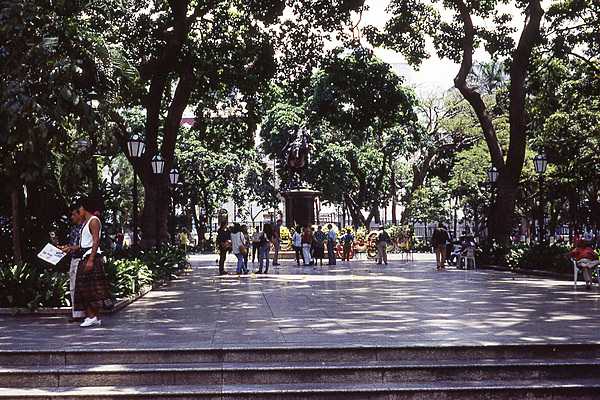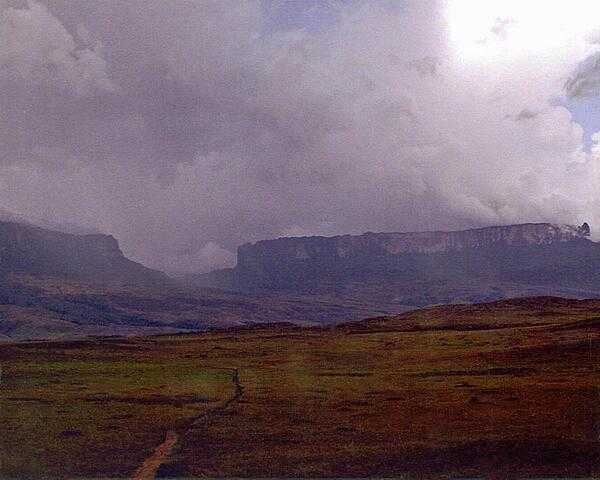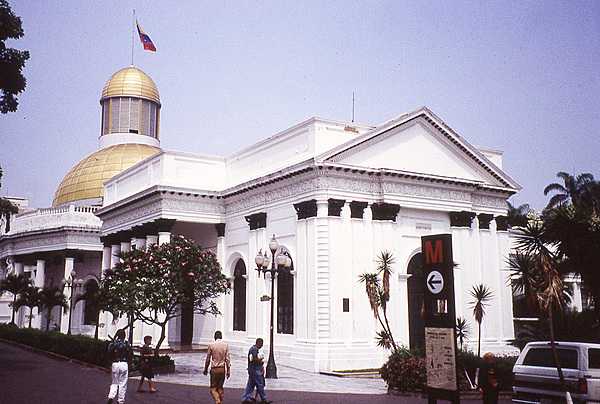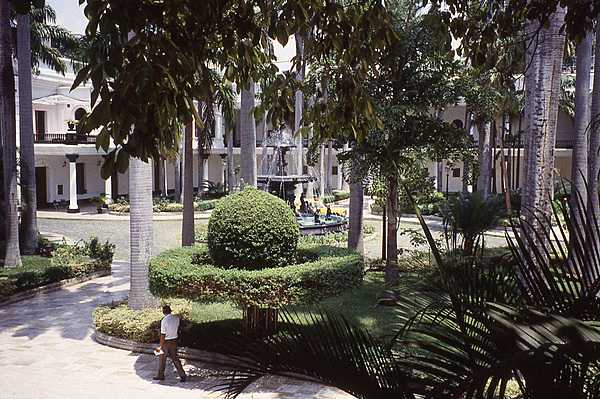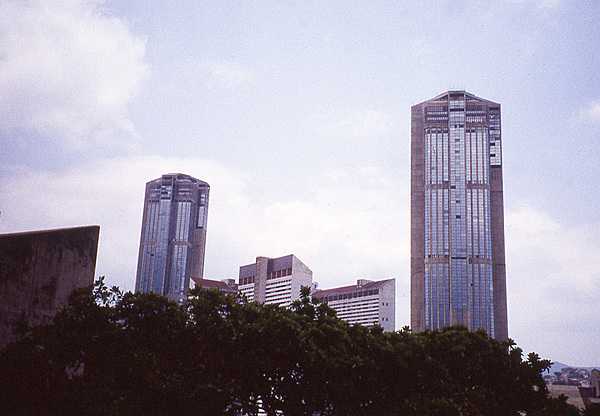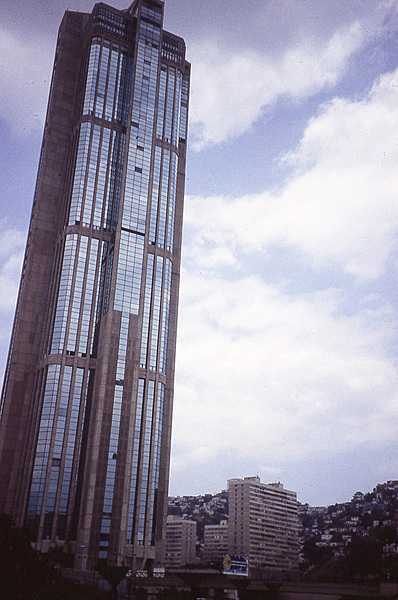Venezuela - VE - VEN - VEN - South America
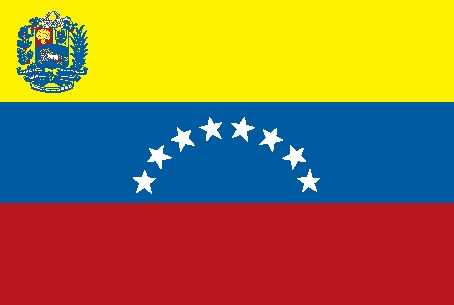
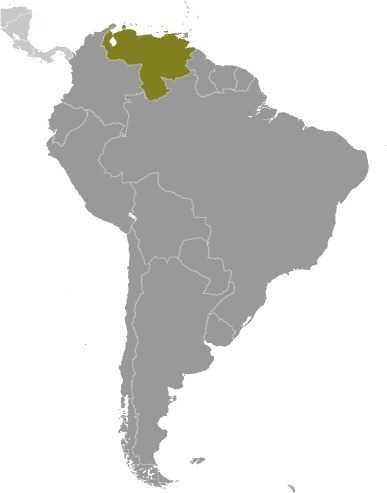
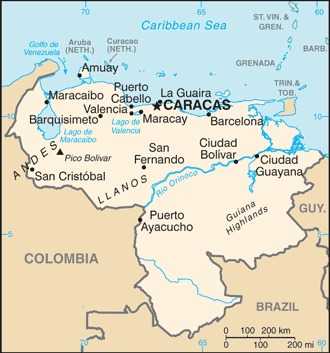
Venezuela Images
Venezuela Factbook Data
Diplomatic representation from the US
embassy: Venezuela Affairs Unit, US Embassy, Carrera 45 N. 24B-27, Bogota, Colombia
mailing address: 3140 Caracas Place, Washington DC 20521-3140
telephone: 1-888-407-4747
email address and website:
ACSBogota@state.gov
https://ve.usembassy.gov/
Age structure
15-64 years: 65.9% (male 10,264,353/female 10,330,376)
65 years and over: 9.1% (2024 est.) (male 1,303,737/female 1,553,172)
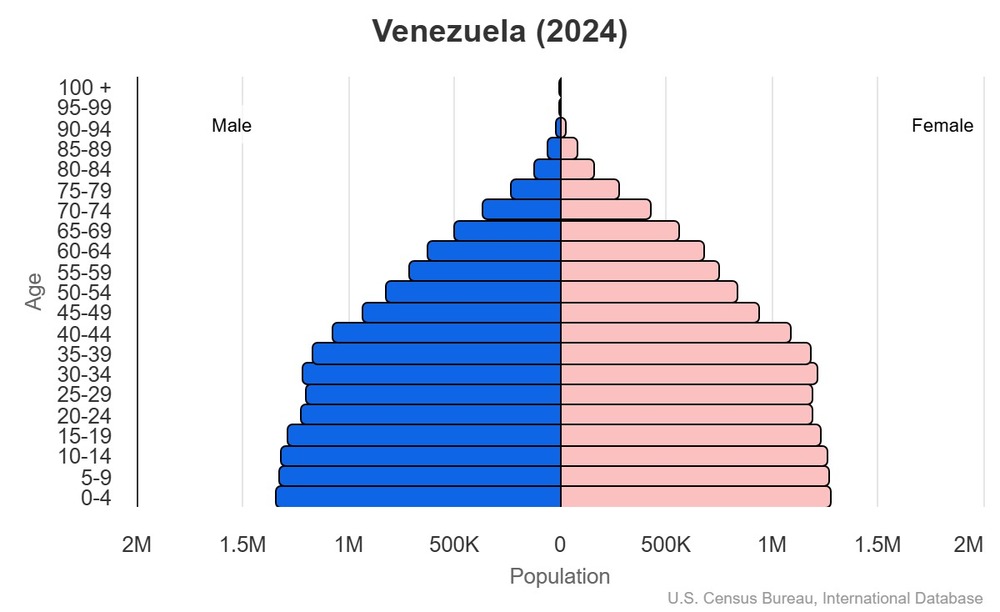
For additional information, please see the entry for Population pyramid on the Definitions and Notes page.
Geographic coordinates
Sex ratio
0-14 years: 1.05 male(s)/female
15-64 years: 0.99 male(s)/female
65 years and over: 0.84 male(s)/female
total population: 0.99 male(s)/female (2024 est.)
Natural hazards
Area - comparative
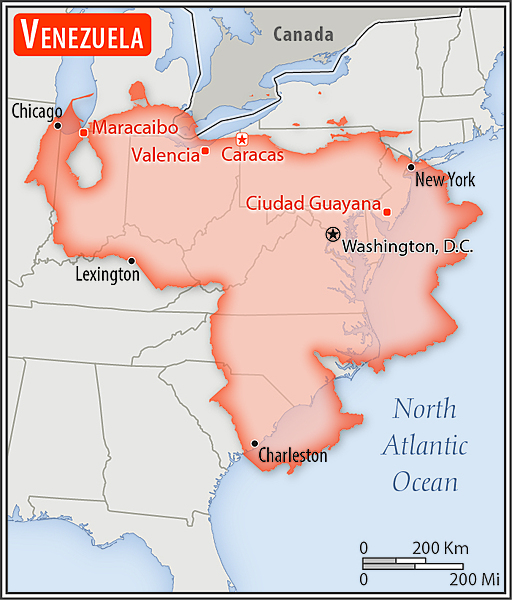
almost six times the size of Georgia; slightly more than twice the size of California
Military service age and obligation
Background
Venezuela was one of three countries that emerged from the collapse of Gran Colombia in 1830, the others being Ecuador and New Granada (Colombia). For most of the first half of the 20th century, military strongmen ruled Venezuela and promoted the oil industry while allowing some social reforms. Democratically elected governments largely held sway until 1999, but Hugo CHAVEZ, who was president from 1999 to 2013, exercised authoritarian control over other branches of government. This trend continued in 2018 when Nicolas MADURO claimed the presidency for his second term in an election boycotted by most opposition parties and widely viewed as fraudulent. The legislative elections in 2020 were also seen as fraudulent, and most opposition parties and many international actors consider the resulting National Assembly illegitimate. In 2021, many opposition parties broke a three-year election boycott and participated in mayoral and gubernatorial elections, despite flawed conditions. As a result, the opposition more than doubled its representation at the mayoral level and retained four of 23 governorships. The 2021 regional elections marked the first time since 2006 that the EU was allowed to send an electoral observation mission to Venezuela.
MADURO has placed strong restrictions on free speech and the press. Since CHAVEZ, the ruling party has expanded the state's role in the economy through expropriations of major enterprises, strict currency exchange and price controls, and over-dependence on the petroleum industry for revenues. Years of economic mismanagement left Venezuela ill-prepared to weather the global drop in oil prices in 2014, sparking an economic decline that has resulted in reduced government social spending, shortages of basic goods, and high inflation. Worsened living conditions have prompted nearly 8 million Venezuelans to emigrate, mainly settling in nearby countries. The US imposed financial sanctions on MADURO and his representatives in 2017 and on sectors of the Venezuelan economy in 2018. Limited sanctions relief followed when the MADURO administration began making democratic and electoral concessions.
The government's mismanagement and lack of investment in infrastructure has also weakened the country's energy sector. Caracas has relaxed some controls to mitigate the impact of its sustained economic crisis, such as allowing increased import flexibility for the private sector and the informal use of US dollars and other international currencies. Ongoing concerns include human rights abuses, rampant violent crime, political manipulation of the judicial and electoral systems, and corruption.
Environmental issues
International environmental agreements
signed, but not ratified: none of the selected agreements
Military expenditures
0.5% of GDP (2023 est.)
0.6% of GDP (2022 est.)
0.3% of GDP (2021 est.)
1.6% of GDP (2020 est.)
Population below poverty line
note: % of population with income below national poverty line
Exports - commodities
note: top five export commodities based on value in dollars
Exports - partners
note: top five export partners based on percentage share of exports
Administrative divisions
note: the federal dependency consists of 11 federally controlled island groups with a total of 72 individual islands
Agricultural products
note: top ten agricultural products based on tonnage
Military and security forces
Ministry of Interior, Justice, and Peace: Bolivarian National Police (Policía Nacional Bolivariana, PNB) (2025)
note 1: the Bolivarian Militia and the Presidential Honor Guard are considered special/secondary components of the FANB; the Militia is composed of the Military Reserve and the Territorial Militia and is comprised of armed civilians who receive periodic training in exchange for a small stipend
note 2: the National Guard was made part of the FANB in 2007 and is responsible for maintaining public order, guarding the exterior of key government installations and prisons, conducting counter-narcotics operations, monitoring borders, and providing law enforcement in remote areas; it reports to both the Ministry of Defense and the Ministry of Interior, Justice, and Peace
note 3: the PNB is a federal force created by Hugo CHAVEZ in 2008 as a “preventative police force,” separate from state and local ones; the PNB largely focuses on policing Caracas’ Libertador municipality, patrolling Caracas-area highways, railways, and metro system, and protecting diplomatic missions; the PNB includes the Special Action Forces (Fuerzas de Acciones Especiales, FAES), a paramilitary unit created by President MADURO to bolster internal security after the 2017 anti-government protests
Budget
expenditures: $76 million (2017 est.)
Capital
geographic coordinates: 10 29 N, 66 52 W
time difference: UTC-4 (1 hour ahead of Washington, DC, during Standard Time)
etymology: named for the Caracas tribe that originally settled in the area; the origin of their name is unknown
Imports - commodities
note: top five import commodities based on value in dollars
Climate
Coastline
Constitution
amendment process: proposed through agreement by at least 39% of the National Assembly membership, by the president of the republic in session with the cabinet of ministers, or by petition of at least 15% of registered voters; passage requires simple majority vote by the Assembly and simple majority approval in a referendum
Exchange rates
Exchange rates:
9.975 (2017 est.)
9.257 (2016 est.)
6.284 (2015 est.)
6.284 (2014 est.)
6.048 (2013 est.)
Flag
meaning: yellow stands for the riches of the land, blue for the courage of its people, and red for the blood shed in attaining independence
history: the flag retains the three equal horizontal bands and three main colors from the flag of Gran Colombia, the South American republic that broke up in 1830; in 2006, President Hugo CHAVEZ added the eighth star -- the original seven stars represented the country's provinces that united in the war of independence -- to match Simon Bolivar's flag from 1827 and to represent the historic province of Guayana
Illicit drugs
major illicit drug-producing and/or drug-transit country
major precursor-chemical producer (2025)
Independence
Industries
Judicial branch
judge selection and term of office: judges proposed by the Committee of Judicial Postulation (an independent body of organizations dealing with legal issues and of the organs of citizen power) and appointed by the National Assembly; judges serve nonrenewable 12-year terms
subordinate courts: Superior or Appeals Courts (Tribunales Superiores); District Tribunals (Tribunales de Distrito); Courts of First Instance (Tribunales de Primera Instancia); Parish Courts (Tribunales de Parroquia); Justices of the Peace (Justicia de Paz) Network
Land boundaries
border countries (3): Brazil 2,137 km; Colombia 2,341 km; Guyana 789 km
Land use
arable land: 2.9% (2023 est.)
permanent crops: 0.8% (2023 est.)
permanent pasture: 20.6% (2023 est.)
forest: 53.5% (2023 est.)
other: 22.1% (2023 est.)
Legal system
Legislative branch
legislative structure: unicameral
number of seats: 277 (all directly elected)
electoral system: mixed system
scope of elections: full renewal
term in office: 5 years
most recent election date: 12/6/2020
percentage of women in chamber: 32.1%
expected date of next election: May 2025
note: in 2020, the National Electoral Council increased the number of seats in the National Assembly from 167 to 277 for the December 2020 election
Literacy
male: 97.2% (2017 est.)
female: 97.3% (2017 est.)
Maritime claims
contiguous zone: 15 nm
exclusive economic zone: 200 nm
continental shelf: 200-m depth or to the depth of exploitation
International organization participation
National holiday
Nationality
adjective: Venezuelan
Natural resources
Geography - note
note 2: Venezuela has some of the most unique geology in the world; tepuis are the massive table-top mountains of the western Guiana Highlands that tend to be isolated and thus support unique endemic plant and animal species; their sheer cliffsides help create some of the most spectacular waterfalls in the world, including Angel Falls, the world's highest (979 m; 3,212 ft) that drops from Auyan Tepui
Economic overview
Political parties
Cambiemos Movimiento Ciudadano or CMC
Christian Democrats or COPEI (also known as the Social Christian Party)
Citizens Encounter or EC
Clear Accounts or CC
Coalition of parties loyal to Nicolas MADURO - Great Patriotic Pole or GPP
Coalition of opposition parties - Democratic Alliance (Alianza Democratica) (includes AD, EL CAMBIO, COPEI, CMC, and AP)
Come Venezuela (Vente Venezuela) or VV
Communist Party of Venezuela or PCV
Consenso en la Zona or Conenzo
Convergencia
Democratic Action or AD
Fatherland for All (Patria para Todos) or PPT
Fearless People's Alliance or ABP
Fuerza Vecinal or FV
Hope for Change (Esperanza por el Cambio) or EL CAMBIO
Justice First (Primero Justicia) or PJ
LAPIZ
Movement to Socialism (Movimiento al Socialismo) or MAS
Popular Will (Voluntad Popular) or VP
Progressive Advance (Avanzada Progresista) or AP
The Radical Cause or La Causa R
United Socialist Party of Venezuela or PSUV
Venezuela First (Primero Venezuela) or PV
Venezuelan Progressive Movement or MPV
Venezuela Project or PV
Railways
standard gauge: 447 km (2014) 1.435-m gauge (41.4 km electrified)
Suffrage
Terrain
Government type
Country name
conventional short form: Venezuela
local long form: República Bolivariana de Venezuela
local short form: Venezuela
former: State of Venezuela, Republic of Venezuela, United States of Venezuela
etymology: in 1499, the stilt-houses built on Lake Maracaibo reminded explorers Alonso de OJEDA and Amerigo VESPUCCI of buildings in Venice, Italy, and they named the region "Venezuola," meaning "Little Venice"
Location
Map references
Irrigated land
Diplomatic representation in the US
note: the embassy, which had been run by the Venezuelan political opposition, announced on 5 January 2023, that it had ended all embassy functions
Internet users
Internet country code
Refugees and internally displaced persons
IDPs: 2,338 (2024 est.)
GDP (official exchange rate)
note: data in current dollars at official exchange rate
Trafficking in persons
Total renewable water resources
Urbanization
rate of urbanization: 1.16% annual rate of change (2020-25 est.)
Broadcast media
Drinking water source
total: 93.3% of population (2022 est.)
unimproved:
total: 6.7% of population (2022 est.)
National anthem(s)
lyrics/music: Vicente SALIAS/Juan Jose LANDAETA
history: adopted 1881; lyrics were written in 1810; both SALIAS and LANDAETA were executed in 1814 during Venezuela's fight for independence
Major urban areas - population
International law organization participation
Hospital bed density
National symbol(s)
Dependency ratios
youth dependency ratio: 37.9 (2024 est.)
elderly dependency ratio: 13.9 (2024 est.)
potential support ratio: 7.2 (2024 est.)
Citizenship
citizenship by descent only: yes
dual citizenship recognized: yes
residency requirement for naturalization: 10 years; reduced to five years in the case of applicants from Spain, Portugal, Italy, or a Latin American or Caribbean country
Population distribution
Electricity access
Civil aircraft registration country code prefix
Sanitation facility access
total: 98.4% of population (2022 est.)
unimproved:
total: 1.6% of population (2022 est.)
Ethnic groups
Religions
Languages
major-language sample(s):
La Libreta Informativa del Mundo, la fuente indispensable de información básica. (Spanish)
The World Factbook, the indispensable source for basic information.
Imports - partners
note: top five import partners based on percentage share of imports
Elevation
lowest point: Caribbean Sea 0 m
mean elevation: 450 m
Physician density
Health expenditure
6% of national budget (2022 est.)
Military and security service personnel strengths
Terrorist group(s)
note: details about the history, aims, leadership, organization, areas of operation, tactics, targets, weapons, size, and sources of support of the group(s) appear(s) in the Terrorism reference guide
Total water withdrawal
industrial: 793.3 million cubic meters (2022 est.)
agricultural: 16.71 billion cubic meters (2022 est.)
Waste and recycling
percent of municipal solid waste recycled: 21.3% (2022 est.)
Average household expenditures
on alcohol and tobacco: 2.8% of household expenditures (2023 est.)
Major watersheds (area sq km)
Major lakes (area sq km)
Major rivers (by length in km)
note: [s] after country name indicates river source; [m] after country name indicates river mouth
National heritage
selected World Heritage Site locales: Coro and its Port (c); Canaima National Park (n); Ciudad Universitaria de Caracas (c)
Coal
consumption: 80,000 metric tons (2023 est.)
exports: 124,000 metric tons (2023 est.)
imports: 2,000 metric tons (2023 est.)
proven reserves: 730.999 million metric tons (2023 est.)
Electricity generation sources
hydroelectricity: 78.3% of total installed capacity (2023 est.)
Natural gas
consumption: 23.873 billion cubic meters (2023 est.)
proven reserves: 5.674 trillion cubic meters (2021 est.)
Petroleum
refined petroleum consumption: 203,000 bbl/day (2023 est.)
crude oil estimated reserves: 303.806 billion barrels (2021 est.)
Space program overview
Space agency/agencies
note: the ABAE is under the Ministry of Science, Technology, and Innovation; it was originally known as the Venezuelan Space Center (CEV; created 2005)
Ports
large: 1
medium: 2
small: 11
very small: 17
ports with oil terminals: 21
key ports: Amuay (Bahia de Amuay), Bahia de Pertigalete, Ciudad Bolivar, Guanta, La Guaira, La Salina, Las Piedras, Maracaibo, Puerto Cabello, Puerto de Hierro, Puerto la Cruz, Puerto Miranda, Puerto Ordaz, Punta Cardon
National color(s)
Particulate matter emissions
Methane emissions
agriculture: 1,007.8 kt (2019-2021 est.)
waste: 328.3 kt (2019-2021 est.)
other: 7 kt (2019-2021 est.)
Key space-program milestones
2008- first communications satellite (Venesat-1 or Bolivar) financed, built, and launched by China
2012 - first remote sensing (RS) satellite (VRSS-1 or Miranda) built and launched by China
2017 - second RS satellite (VRSS-2 or Sucre) built and launched by China
2021 - signed agreement to establish the Latin American and Caribbean Space Agency (formally established in 2022)
2023 - joined China-Russia project to construct a permanent base on the Moon by the 2030s
2025 - announced intent to participate in planned Mars sample-return mission (Tianwen-3) led by China
Labor force
note: number of people ages 15 or older who are employed or seeking work
Youth unemployment rate (ages 15-24)
male: 9.3% (2024 est.)
female: 13.2% (2024 est.)
note: % of labor force ages 15-24 seeking employment
Maternal mortality ratio
Reserves of foreign exchange and gold
$10.15 billion (2016 est.)
$15.625 billion (2015 est.)
note: holdings of gold (year-end prices)/foreign exchange/special drawing rights in current dollars
Public debt
note: data cover central government debt, as well as the debt of state-owned oil company PDVSA; the data include treasury debt held by foreign entities; the data include some debt issued by subnational entities, as well as intragovernmental debt; intragovernmental debt consists of treasury borrowings from surpluses in the social funds, such as for retirement, medical care, and unemployment; some debt instruments for the social funds are sold at public auctions
Unemployment rate
5.5% (2023 est.)
5.8% (2022 est.)
note: % of labor force seeking employment
Population
male: 15,555,451
female: 15,694,855
Carbon dioxide emissions
from coal and metallurgical coke: 179,000 metric tonnes of CO2 (2023 est.)
from petroleum and other liquids: 27.928 million metric tonnes of CO2 (2023 est.)
from consumed natural gas: 48.623 million metric tonnes of CO2 (2023 est.)
Area
land: 882,050 sq km
water: 30,000 sq km
Real GDP (purchasing power parity)
$106.672 billion (2022 est.)
$98.768 billion (2021 est.)
note: data in 2015 dollars
Airports
Inflation rate (consumer prices)
1,588.5% (2021 est.)
2,355.1% (2020 est.)
note: annual % change based on consumer prices
Current account balance
-$3.87 billion (2016 est.)
-$16.051 billion (2015 est.)
note: balance of payments - net trade and primary/secondary income in current dollars
Real GDP per capita
$4,600 (2022 est.)
$4,000 (2021 est.)
note: data in 2015 dollars
Broadband - fixed subscriptions
subscriptions per 100 inhabitants: 10 (2022 est.)
Obesity - adult prevalence rate
Energy consumption per capita
Electricity
consumption: 56.493 billion kWh (2023 est.)
exports: 600 million kWh (2023 est.)
transmission/distribution losses: 25.849 billion kWh (2023 est.)
Merchant marine
by type: bulk carrier 3, container ship 1, general cargo 26, oil tanker 17, other 225
Imports
$18.376 billion (2017 est.)
$25.81 billion (2016 est.)
note: balance of payments - imports of goods and services in current dollars
Exports
$93.485 billion (2017 est.)
$28.684 billion (2016 est.)
note: balance of payments - exports of goods and services in current dollars
Heliports
Telephones - fixed lines
subscriptions per 100 inhabitants: 10 (2022 est.)
Alcohol consumption per capita
beer: 1.54 liters of pure alcohol (2019 est.)
wine: 0.01 liters of pure alcohol (2019 est.)
spirits: 0.92 liters of pure alcohol (2019 est.)
other alcohols: 0.03 liters of pure alcohol (2019 est.)
Life expectancy at birth
male: 71.5 years
female: 77.7 years
Real GDP growth rate
-14% (2017 est.)
-15.76% (2017 est.)
note: annual GDP % growth based on constant local currency
Education expenditure
10.3% national budget (2024 est.)
Military - note
the FANB has a role in the country’s economy and political sectors; military officers hold key positions in state-owned companies, government ministries, and funding agencies; the FANB runs corporation involved in agriculture, banking, communications, energy, insurance, mining, and transportation (2025)
Military equipment inventories and acquisitions
Executive branch
head of government: Interim President Delcy Eloína RODRÍGUEZ Gómez (since 5 January 2025)
cabinet: Council of Ministers appointed by the president
election/appointment process: president directly elected by simple-majority popular vote for a 6-year term (no term limits)
most recent election date: 28 July 2024
election results:
2024: official results disputed; Nicolas MADURO Moros was declared the winner by the MADURO-controlled National Electoral Council; percent of vote - Nicolas MADURO Moros (PSUV) 52%, Edmundo GONZÁLEZ Urrutia (Independent) 43.2%, Luis Eduardo MARTÍNEZ (AD) 1.2%, other 3.6%
2018: Nicolas MADURO Moros reelected president; percent of vote - Nicolas MADURO Moros (PSUV) 67.9%, Henri FALCON (AP) 20.9%, Javier BERTUCCI 10.8%
expected date of next election: unknown
note 1: the president is both chief of state and head of government
note 2: in January 2026, the United States removed Nicolas MADURO Moros from his position as leader; Interim President RODRÍGUEZ has been sworn in and is expected to remain during a transition period
note 3: the United States did not recognize Nicolas MADURO Moros as president of Venezuela; the United States recognized that Edmundo GONZÁLEZ won the most votes in the 28 July 2024 presidential election because of overwhelming evidence, including more than 80% of the tally sheets received directly from polling stations that indicated GONZÁLEZ received the most votes by an insurmountable margin
Gross reproduction rate
Net migration rate
Median age
male: 30.3 years
female: 31.7 years
Total fertility rate
Infant mortality rate
male: 15.4 deaths/1,000 live births
female: 12.2 deaths/1,000 live births
Telephones - mobile cellular
subscriptions per 100 inhabitants: 63 (2022 est.)
